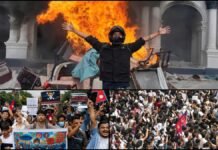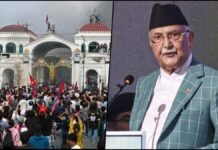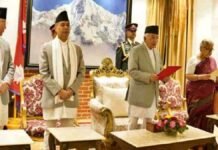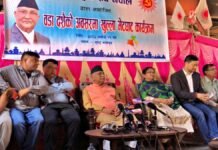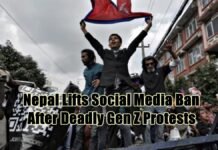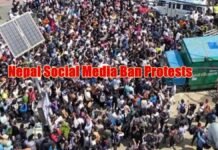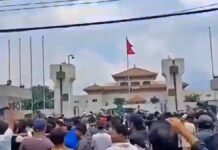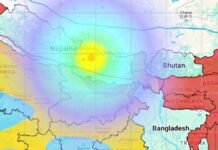
Key Points:
- Rajyalaxmi Chitrakar, wife of former PM Jhalanath Khanal, died from burn injuries after protesters set their Kathmandu residence on fire
- Prime Minister KP Sharma Oli resigned on Tuesday amid escalating Gen Z protests that claimed at least 22 lives
- Parliament building and multiple political leaders’ homes torched, including those of current and former PMs
- Nepal Army stepping in to maintain order after key ministers resigned following deadly confrontations
- President Ram Chandra Paudel called for dialogue as indefinite curfew imposed across Kathmandu Valley
Kathmandu: Nepal has plunged into its deepest political crisis in years after the tragic death of Rajyalaxmi Chitrakar, wife of former Prime Minister Jhalanath Khanal, who succumbed to severe burn injuries sustained when anti-government protesters set their residence ablaze in Kathmandu’s Dallu area.
The shocking incident occurred on Tuesday when angry demonstrators surrounded and set fire to the former PM’s house, trapping Chitrakar inside. According to family sources, she was rushed to Kirtipur Burn Hospital in critical condition but died during treatment despite medical efforts. Her son Nirbhik Khanal was also present during the attack but managed to escape.
Political Establishment Under Attack
The arson targeting Khanal’s residence represents a dramatic escalation in the Gen Z-led protests that have rocked Nepal since Monday. Demonstrators have systematically targeted the political elite, setting fire to the homes of multiple high-ranking officials including Prime Minister KP Sharma Oli, former PMs Pushpa Kamal Dahal ‘Prachanda’ and Sher Bahadur Deuba.
Former Foreign Minister Arzu Rana Deuba, wife of ex-PM Sher Bahadur Deuba, was also reportedly assaulted during an attack on their residence. Additionally, protesters vandalized the home of Nepal Rastra Bank Governor Biswo Paudel and targeted offices of major political parties.
Parliament Building Set Ablaze
In unprecedented scenes of civil unrest, protesters breached and torched the Federal Parliament building in Singha Durbar, the seat of Nepal’s government. The presidential palace Sheetal Niwas was also set on fire as demonstrators defied curfew orders and clashed with security forces.
Tribhuvan International Airport was temporarily shut down due to safety concerns as fires raged nearby, while multiple government buildings across Kathmandu suffered damage.
Prime Minister Oli Resigns Under Pressure
Facing mounting pressure and escalating violence, Prime Minister KP Sharma Oli submitted his resignation to President Ram Chandra Paudel on Tuesday afternoon, citing “extraordinary circumstances” and the need for a “constitutional political solution”.
In his resignation letter, Oli acknowledged the gravity of the situation and stepped aside “in view of the adverse situation in the country” to enable political dialogue. Sources indicate that Army Chief General Ashok Raj Sigdel advised Oli to resign, warning that military intervention could only stabilize the situation if he relinquished power.
Mass Resignations Rock Government
The political crisis has triggered a cascade of resignations from key government officials. Home Minister Ramesh Lekhak, Agriculture Minister Ramnath Adhikari, Youth and Sports Minister Teju Lal Chaudhary, and Water Minister Pradeep Yadav have all stepped down amid the unrest.
The resignations leave Nepal facing a constitutional vacuum as the country grapples with its worst political crisis in decades.
Army Steps In as Violence Escalates
With civilian leadership collapsing, the Nepal Army has stepped in to maintain order, issuing a statement emphasizing its commitment to “safeguarding national independence, sovereignty, and geographical integrity”. The military appealed to citizens, particularly youth, to “play a constructive role in maintaining social harmony and peace”.
An indefinite curfew has been imposed across the Kathmandu Valley, but protesters continue to defy restrictions and clash with security forces. The death toll has risen to at least 22 people with hundreds injured in two days of violence.
President Calls for Dialogue
President Ram Chandra Paudel has accepted Oli’s resignation and called for national dialogue to resolve the crisis. In a statement, he emphasized the need for “cooperation of all sides who love the country” to find a peaceful solution to the ongoing turmoil.
The protests, which began over a social media ban but evolved into broader anti-corruption demonstrations, have exposed deep-seated anger among Nepal’s youth over systemic corruption, nepotism, and economic inequality. The tragic death of Chitrakar marks a grim escalation that has shocked the nation and raised serious questions about the country’s political stability.



































